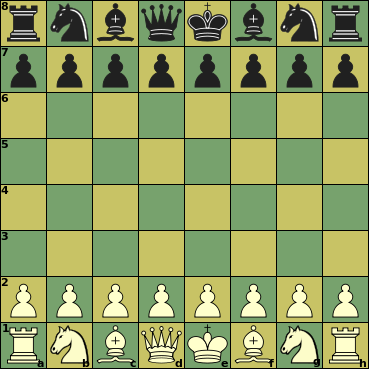Three Checks
 |
Initial setupe1, e8: King |
Moves at a Glance
Click on a piece below to see its moves
 |
 |
 |
 |
Sliding capture or non-capture, can be blocked on any square along the ray |
|||||||
 |
Unblockable leap (capture or non-capture) | ||||||||||
 |
Non-capture only | ||||||||||
 |
Capture only | ||||||||||
 |
 |
 |
 |
 |
 |
 |
|||||
 |
|||||||||||
:
:
:
:
| Piece | ID | value | Moves (Betza notation) | Remarks |
| King | K | - | K | Can castle with Rook, moving 2 steps towards it |
| Queen | Q | 9.5 | RB or Q | |
| Rook | R | 5 | R | |
| Bishop | B | 3.25 | B | Color-bound |
| Knight | N | 3.25 | N | |
| Pawn | P | 1 | mfWcfF | Promotes to Q, R, B, or N on reaching last rank |
Pawn peculiarities
- Pawns capture differently from how they move (straight move, diagonal capture).
- Pawns can move two squares straight ahead from their initial position, provided they are not blocked.
- On the move immediately after such a double push, they can be captured en passant by another Pawn, as if they had only moved 1 square ahead.
- Pawns promote to another (non-royal) piece of choice when they reach last rank.
Castling
A King that has not moved before can move two squares in the direction of a Rook that has not moved before, in which case that Rook is moved to the square the King skipped over. This is only allowed if all squares between King and Rook are empty, when the King is not in check on the square it came from, and would not be in check on any of the squares it skipped over.
General rules
- It is not allowed to expose your King to capture.
- The game is won by checkmating the opponent's King, or by checking it for the third time.
- Stalemate (no legal moves, but not in check) is a draw.
Differences with FIDE
You lose when being checked for the third time.
Strategy issues
Bishops are confined to squares of a single color. Having Bishops on both colors compensates this weakness, and is worth an extra 0.5 on top of their added value.